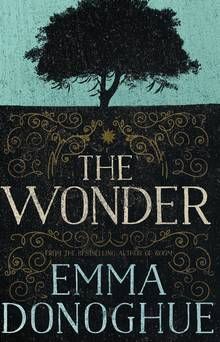Lib Wright, a nurse trained by ‘Miss Nightingale’ is hired for a two-week position in the ‘dead centre’ of Ireland. A young girl has not eaten for 4 months, yet appears to be well. Her fanatically religious parents have proclaimed her to be a miracle, and pilgrims make their way to the cottage to worship the little saint-in-making. If you enjoyed Room, Emma Donoghue’s first book, then you might be put off by the very different subject matter she has chosen here. Don’t be. It is moving, lyrical, intense and surprising.
The remote village is now on the map and there is a debate in the Letters pages of a national newspaper – is this a fake or is the child truly a ‘living marvel’? Lib’s job is not to nurse her, but to use her training to scrutinise the child, keep a daily log, and report her findings to the local committee.
She thought perhaps they’d stand up and say their good nights now. But no, the group plunged into a Hail Mary, and then another, and another. This was ridiculous; was Lib to be stuck here all evening? She blinked to moisten her tired eyes but kept them focused on Anna and on the parents, their solid bodies bracketing their daughter’s. It would take only the briefest meeting of hands for a scrap to be passed over. Lib squinted, making sure nothing touched Anna’s red lips.
What Lib discovers astonishes her. 11-year-old Anna does seem to be well, bright, clear-headed and with a sweet pureness of heart that is indeed almost saint-like. She spends her long days praying, reading, singing and watching birds and flowers – a stark contrast to the impoverishment of spirit shown by her harshly religious parents. Careful to keep the relationship professional, Lib cannot help but be entranced by the child, yet mystified by some of the things she says, and the memories she is holding on to. Allowed no more than a teaspoon of water each day, Anna believes she is surviving on ‘manna from Heaven’. But as the days pass, Anna weakens and Lib’s strict scientific observation gives way to fear for the child’s life. Lib has nowhere to turn for help apart from a journalist who has been sent to cover the story – but can she trust him?
Although the pace of the book falters slightly in the middle, this is a novel preoccupied with the nature of truth, the impact of extremist thinking, the challenging of perceptions, and the transformative power of love. 19th century Ireland is conjured with skill and delicacy, and Donoghue has a brilliant ear for the local idiom. Based on true accounts of ‘fasting girls’, this historical novel may be a far cry from the trenchant and chilling Room, yet here too the focus is on a child caught up in an inexplicably destructive adult world.
With a hugely satisfying ending, this haunting, claustrophobic tale will stay with you long after you have finished it. One tip – don’t listen to it on Audible: the narrator’s efforts to sound authentically ‘Oirish’ may drive you crazy.
The Wonder is published by Picador, 304 pages.





